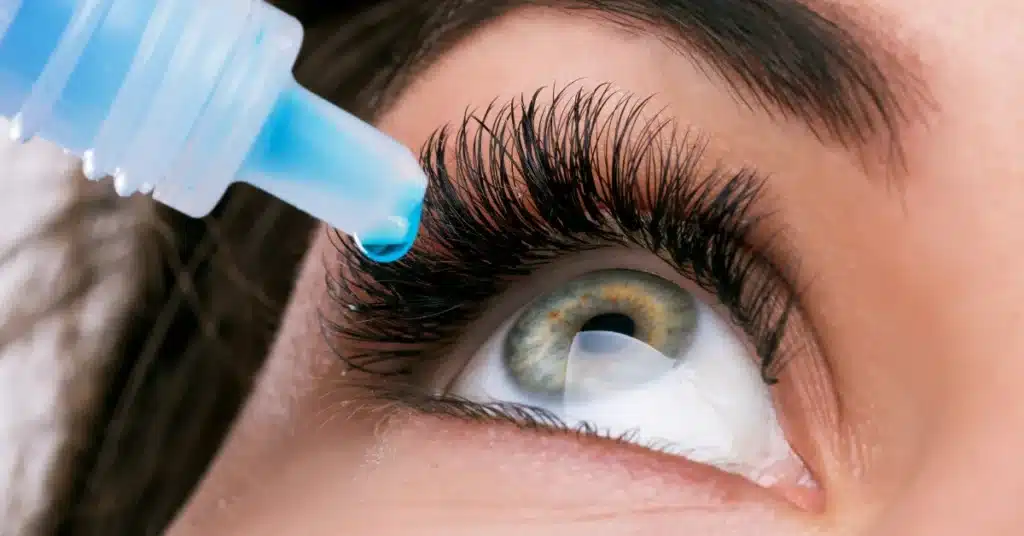Swollen eyes are a fairly common eye problem caused by inflammation or additional fluid retention in the connective tissues that surround the eye.
The problem of eye swelling can range from minor to severe for several reasons.
Most people may get rid of the condition using simple home treatments.
However, in some cases, swollen eyes can be an indication of a serious underlying condition that can cause vision loss if left untreated.
This article will discuss effective at-home care medication for swollen eyes.
Types of medication for swollen eyes
Several conditions, such as allergies, Styes, a blocked gland, traumatic eye injury, Ocular herpes, and Conjunctivitis (often known as “Pink eye“), may result in swollen eyes.
The treatment of swollen eyes depends on the underlying cause.
Most of the time, simple home treatments can help relieve the symptoms.
However, medical treatment is required if your eye swelling gets worse or if it is accompanied by visual abnormalities.
Medications, such as antihistamines, steroid eye drops, and antibiotics, are often recommended to treat swollen eyes, depending upon the cause.
Antihistamines
An allergic response may cause sudden swelling of the eyes.
Eyes can swell when histamine is activated, whether from an airborne allergy like pollen or an applied allergen like eye makeup.
In general, antihistamine drops or oral allergy medicine are effective treatments for swollen eyes caused by allergies.
Over-the-counter oral antihistamines, including Cetirizine, Loratadine, or Diphenhydramine, can help minimize allergic responses that may lead to eye swelling.
Swollen eyes could be the result of several underlying eye conditions. Read our article: Why is my eye swollen (Causes of swollen eye)
Steroid eye drops
 Source: pixelshots
Source: pixelshotsFor severe allergic responses, an eye care expert may also consider mild steroid drops.
Dexamethasone and Prednisolone are some commonly recommended steroid eye drops to reduce swelling and itching in the eyes.
These medications reduce inflammation and decrease the immunological response.
However, these eye drops might cause side effects and may not be appropriate for all illnesses.
Hence, steroid eye drops must only be used under the guidance of a healthcare practitioner.
Antibiotics
Antibiotic eye drops, or ointments, are the primary treatment for swollen eyes caused by Bacterial conjunctivitis or other bacterial infections.
Gentamicin, Ciprofloxacin, and Azithromycin are some of the commonly prescribed antibiotics for relieving symptoms of bacterial eye infections, such as swollen eyes.
These antibiotics may reduce swelling and inflammation and assist in getting rid of the bacteria causing the eye infection.
At-home care for swollen eyes
Besides medications, the following home remedies can aid in overcoming swollen eyes:
- Use a cold compress
- Avoid wearing makeup and contact lenses until swelling decreases
- Do not rub or touch your eyes
- Place tea bags and cucumber over the eyes
- Have a healthy diet full of green vegetables and fruits
- Avoid swimming
- Stay away from irritants, such as pollen, pet dander, and dust
Conclusion
Swollen eyes could be the result of an infection or inflammation.
The medication for swollen eyes depends on the underlying cause of the condition.
These may include antibiotics, antihistamines, and steroid eye drops.
Apart from medical treatments, maintaining proper cleanliness of the eyes, using cold compresses, and keeping away from irritants can also aid in the thorough management of swollen eyes.
However, for an accurate diagnosis and guidance on the best course of action, it is essential to speak with a healthcare provider.
Frequently Asked Questions
What are the medicines that can be used to treat swollen eyes?
Antihistamines, antibiotics, and steroid medicines are commonly prescribed medications to overcome swollen eyes.
Can swollen eyes be cured with antibiotics?
Yes, swollen eyes caused by bacterial infections are often treated with antibiotics, such as Azithromycin and Ciprofloxacin.
What causes swollen eyes?
Swollen eyes could result from allergies, Styes, a blocked gland, traumatic eye injury, Ocular herpes, and Conjunctivitis.
Do allergy eye drops decrease swelling?
Yes, allergy eye drops or antihistamines can overcome swollen eyes.
These may ease the itching, redness, and swelling caused by eye allergies.
What causes eye swelling to go down quickly?
Applying cold compresses, caffeinated tea bags, and cucumber slices can help reduce eye swelling quickly.
When referencing outside resources, GoodrxMedicine always provides full citations. To learn more about the measures we use to maintain the quality of our content, please review our Content Information Policy.











